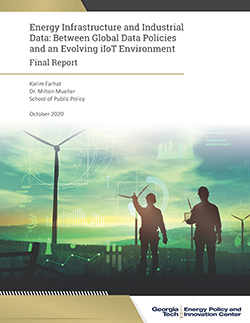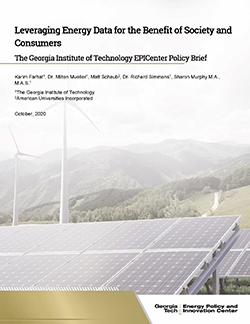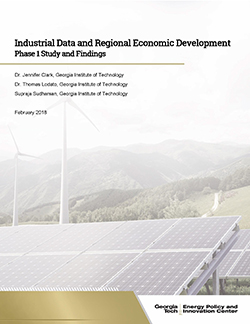Industrial Internet of Things (iIOT) Publications
Energy Infrastructure and Industrial Data: Between Global Data Policies and an Evolving iIoT Environment
This paper identifies the factors shaping Industrial Data (ID) use and sharing among Southeastern energy firms. The research questions underlying this study are: What factors affect an energy firm’s decision to use and share ID; To what extent does ID use entail strategic or collaborative sharing arrangements with other firms and; What are the procedures by which these arrangements take shape?
Contrary to other research findings, agglomeration economies and locational advantages based on Information Technology (IT) infrastructure were not drivers of ID development in the Southeast.
This paper and the research behind it build on previous work by Clark et al. (2019), listed below on this page.
Read the Report
Leveraging Energy Data for the Benefit of Society and Consumers
This policy brief is an adaptation of the paper above, "Energy Infrastructure and Industrial Data: Between Global Data Policies and an Evolving iIoT Environment."
Industrial data (ID) has the potential to play a key role in finding efficiencies in energy markets and thus lower rates for consumers. The realm of industrial data within the energy sector encompasses a broad ecosystem involving many stakeholders. This policy brief is intended to focus specifically on implications for Investor-Owned Utilities (IOUs), energy service and technology providers including Original Equipment Manufacturers (OEMs), policymakers, and researchers, as well as interactions among them.
Read the Policy Brief
Industrial Data and Regional Economic Development: Phase 1 Study and Findings
The digitalization of industries is leading to new services and opportunities for firms, regions and economies. The ability to monitor and diagnose equipment conditions and operations in real-time, respond to changes in equipment performance, and share this data across stakeholders and regulators is expected to improve business profitability, innovation, job growth, and regulatory compliance. The goal of this study is to evaluate the nature of these changes as they relate to the production and use of industrial data. Simultaneously, the study identifies and assesses the factors that influence regional economic development.






